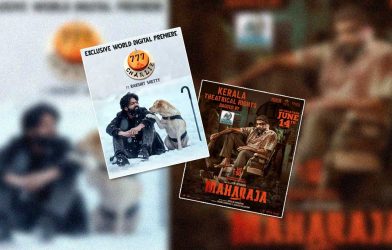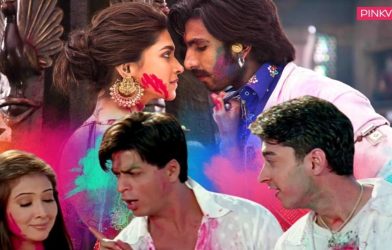While filmmakers have been cashing in on reboots and remixes of old hit songs for several years now, the strategy has begun to pay off even more lately as new tracks fail to find favour with listeners and theatre owners, especially in small towns, lament the absence of soundtracks that can lure audiences to cinemas.
While filmmakers have been cashing in on reboots and remixes of old hit songs for several years now, the strategy has begun to pay off even more lately as new tracks fail to find favour with listeners and theatre owners, especially in small towns, lament the absence of soundtracks that can lure audiences to cinemas.
Traditionally, hit songs could boost a film’s opening box office revenue by at least 20%, serving as a vital marketing tool but post covid, there has been a noticeable decline in music marketing efforts by studios as new tracks struggle to find favour with movie-goers. However, the fact that new versions of hits such as Dekha Tenu, Choli Ke Peeche and Ishq Vishk have been topping charts of late, helping prospects of the films they have been featured in, could be some reason for cheer.
Premium benefits
35+ Premium articles every day
Specially curated Newsletters every day
Access to 15+ Print edition articles every day
Subscriber only webinar by specialist journalists
E Paper, Archives, select The Wall Street Journal & The Economist articles
Access to Subscriber only specials : Infographics I Podcasts
Unlock 35+ well researched
premium articles every day
Access to global insights with
100+ exclusive articles from
international publications
5+ subscriber only newsletters
specially curated by the experts
Free access to e-paper and
WhatsApp updates
Traditionally, hit songs could boost a film’s opening box office revenue by at least 20%, serving as a vital marketing tool but post covid, there has been a noticeable decline in music marketing efforts by studios as new tracks struggle to find favour with movie-goers. However, the fact that new versions of hits such as Dekha Tenu, Choli Ke Peeche and Ishq Vishk have been topping charts of late, helping prospects of the films they have been featured in, could be some reason for cheer.
Remixes pique audience interest
“Because of their familiarity, remixes and remakes pique the audience’s interest faster than fresh content,” Hamza Kazi, head of the music division at Dharma Cornerstone Agency, said. “The audience’s attention span has reduced considerably. If there is a familiar tune embedded within a catchy track, it might have a higher potential for virality. Due to familiarity and decreasing attention spans, it is easier and safer for labels to churn out remakes rather than original songs.”
DCA is the talent management agency owned by Karan Johar’s Dharma Productions and Bunty Sajdeh’s Cornerstone. A new version of Dekha Tenu, originally part of Johar’s own film Kabhi Khushi Kabhie Gham, was featured in the company’s recent release Mr & Mrs Mahi. While some fresh and original tracks, too, have found resonance, the cultural relevance of a song through generations usually aids the music supervisor in selecting a song (for a remix or reboot), Kazi added.
Powerful marketing tool
Strategically used remixes can be a powerful marketing tool agreed Kumar Taurani-managing director-TIPS Industries, producers of Ishq Vishk. “They leverage existing audience familiarity with beloved songs, generating instant interest and a sense of nostalgia. This pre-existing connection with the audience gives the film a significant marketing advantage. The 90s, for instance, witnessed a phenomenal music explosion, and those songs are particularly sought-after for recreations,” Taurani added. The cost of acquisition is justified when the song plays a pivotal role in the film’s marketing campaign, Taurani said.
The decision on the song to remix depends on the commercials associated, said Tusharr Kumar, chief operating officer, Only Much Louder (OML) Entertainment, a media and entertainment company. “Some songs which have been super successful in the past will have large licensing price tags and sometimes that can be a barrier as well. Pricing will always be driven by three things—the width and formats the rights are being acquired for, and the demand and legacy the track holds. Acquisition rates and licensing fees have undergone an overhaul in the last few decades, in order to protect the rights of artists or labels,” Kumar explained.
Nostalgia works
A senior executive at a music label said the nostalgia factor associated with an old hit always works in its favour coupled with some kind of a new rhythm to capture a new audience pool. “Especially post covid, we see that entirely new music doesn’t have the same impact and is forgotten quite easily. Also, people are not spending that much time on completing a song anymore. So it needs to register quickly,” the person said. Besides, filmmakers and labels are no longer going for songs older than the 1990s, in order to target the demographic currently in its 30s, with paying propensity. Further, most labels go for songs from their own catalogue, as the cost of acquisitions has spiked over the past few years.
To be sure, most industry experts agree this trend is effective, especially in marketing because these songs trigger nostalgia and often connect with people faster than new tracks.
“Despite the potential high acquisition rates, the role that a song plays in the marketing campaign can justify the cost. Music is a powerful tool – it can connect with audiences on a deeper level and make your entire campaign more impactful. The right song can be the soundtrack to your movie’s success. It’s a high-priority investment because the right music can make or break your campaign,” said Shruti Deora, senior vice-president at digital agency White Rivers Media.









